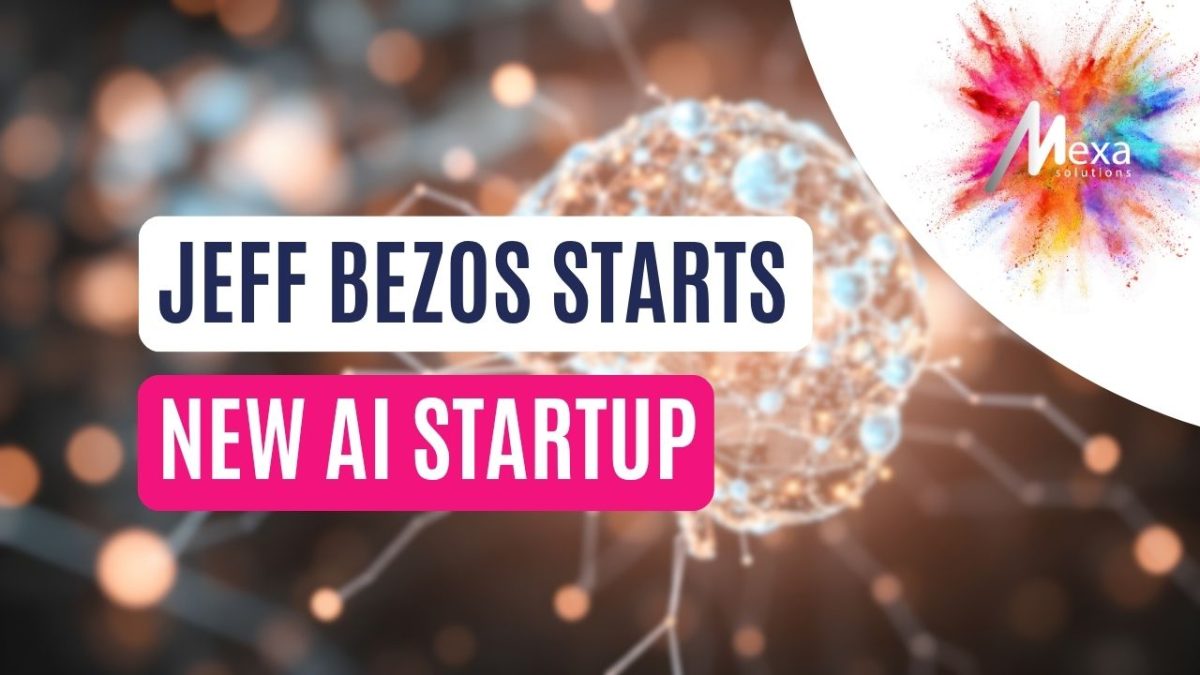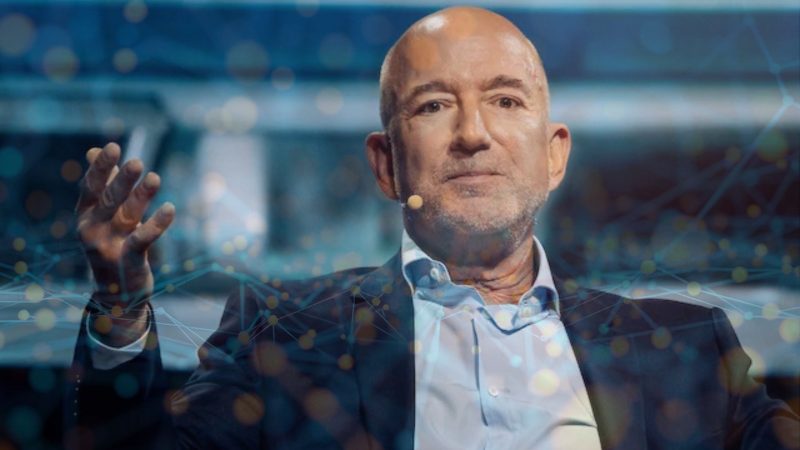
When Jeff Bezos steps back into an operational role, the world takes notice. This time, he’s not returning to Amazon but to a new venture called Project Prometheus, a secretive AI startup backed by a staggering 6.2 billion in funding.
With Bezos as co-CEO, Prometheus shows that the next wave of AI could focus on the physical world, not just digital. In this blog we will look at what this project is, what that means for jobs, how Mexa Solutions can help and how you can make yourself ready to adapt to new changes.
What Is Project Prometheus?
While many leading AI companies such as OpenAI, Google and Meta are building technologies that could accelerate scientific and mathematical breakthroughs using large language models, a new wave of startups is emerging with a very different focus.
Instead of training AI solely on digital information, these companies aim to create systems that learn directly from physical experimentation. One example is Periodic Labs, which plans to build a large-scale automated laboratory run by robots capable of performing continuous real-world experiments that AI can learn from.
Project Prometheus appears to be moving in a similar direction. Reportedly launched early this November and backed by 6.2 billion dollars in funding, it is already one of the most well-funded early stage AI ventures in the world. Rather than concentrating on chatbots or recommendation systems, Prometheus aims to bring AI into the physical economy, with potential applications in manufacturing, aerospace, robotics and complex systems design.
The company has already hired nearly 100 employees highly skilled AI engineers and scientists, many of whom previously worked at OpenAI, DeepMind and Meta. Their mission is to build AI systems capable of designing, testing and optimising real-world products, potentially transforming how physical innovation happens.
The name “Prometheus” reinforces the ambition. In Greek mythology, Prometheus brought fire to humanity, representing both progress and risk. The choice suggests that this project is not simply about new technology but about reshaping how innovation in the physical world takes place, with significant potential rewards and challenges ahead.
What Makes This Artificial Intelligence Different
While most AI headlines focus on text-based models, the Prometheus project aims in taking a different approach. Its AI systems could prototype physical products, manage production lines, and optimize aerospace components in real time. This could drastically shorten design cycles, cut costs, and boost efficiency in industries that have traditionally been slow to adopt AI.
If successful, Prometheus could usher in a new era of industrial AI, turning factories into intelligent, self-optimizing environments.
The Job Landscape
With all this potential comes significant uncertainty for the workforce. The impact on jobs is likely to be complex and multifaceted, affecting different sectors in different ways.
From January to early June 2025, nearly 78,000 technology jobs were lost directly due to AI-driven automation, with major cuts at companies like Amazon and Microsoft. On average, 491 jobs were eliminated every day as AI automates conventional roles. This real-world figure shows that advanced AI is not just a future concern but is actively shaping the workforce today.
Short-Term Effects
The immediate impact is likely to show up in how companies hire, train and structure technical roles as AI begins to influence day-to-day production and development work.
Talent competition
Project Prometheus is already attracting elite AI researchers from OpenAI, DeepMind and Meta. This is likely to intensify demand for AI talent and make recruitment more competitive across the sector. As AI expands into the physical economy, including manufacturing, aerospace and complex systems design, companies will increasingly need professionals who combine AI expertise with real-world engineering skills, creating both opportunities and challenges for the workforce.
Automation of Research and development roles:
As AI takes on more design and testing tasks, the demand for traditional engineering and prototyping roles may decline. AI systems can quickly generate and evaluate multiple design iterations, identify potential flaws, and optimise performance far faster than human engineers alone.
While this could increase efficiency and reduce costs, it also means that some routine or repetitive engineering tasks could be automated, shifting the workforce toward roles that involve overseeing integrating robotics, and interpreting complex data. Companies may need to invest in reskilling and training programs to help engineers adapt to this changing landscape and remain competitive in a world where AI handles more of the hands-on design work.
Manufacturing disruption
Factories adopting Prometheus-style AI could automate many tasks traditionally performed by humans, including assembly line work and quality-control inspections. This automation has the potential to increase efficiency and reduce costs, but it could also lead to job displacement for workers in these roles.
At the same time, it may create new opportunities in areas such as AI supervision, robotics maintenance, and system optimisation, requiring workers to adapt and develop new technical skills. Companies that embrace this transition will need to invest in training and reskilling programs to help employees thrive alongside AI-driven systems.
Long-Term Transformations
Over the long term, AI is expected to reshape industries, create new types of jobs, and change the skills workers need to thrive.
New Job types
As Project Prometheus and similar ventures grow, new types of jobs are likely to emerge. These could include roles focused on AI integration, sensor management, and AI model validation. Workers who can supervise, interpret, and enhance AI systems will be in high demand, bridging the gap between automated processes and human oversight.
As AI takes on more of the design and production workload, companies may also need specialists who can ensure safety, compliance, and performance standards for AI-driven operations. This shift represents an opportunity for workers to develop highly specialised technical skills and positions that did not exist in traditional manufacturing and engineering environments.
Reskilling needs
Traditional manufacturing workers may need new training to stay competitive as AI becomes more common on factory floors. Instead of focusing only on manual tasks, workers may need to learn how to operate, monitor and work alongside AI-powered machines and software.
At the same time, soft skills such as communication, problem-solving and teamwork will remain essential, making it important for workers to continue developing these abilities alongside technical skills. This combination of technical and interpersonal skills will help employees adapt and thrive in modern production environments.
Geographic shifts
Faster, AI-driven production could significantly change where goods are manufactured. Regions with advanced AI infrastructure and skilled workforces may see an influx of new jobs, as companies set up factories or labs that leverage intelligent systems. Conversely, areas that rely on traditional manufacturing methods could experience a decline in employment as production becomes more automated and centralised.
This geographic shift could have broader economic implications, affecting local economies, supply chains, and workforce planning. Workers and policymakers will need to anticipate these changes, focusing on reskilling, infrastructure development, and strategic investments to ensure communities remain competitive in an AI-driven economy.
Economic concentration
Highly funded AI-manufacturing companies could end up dominating their industries. This might put smaller competitors at a disadvantage and threaten the jobs they support. Over time, this could change the balance of the market and make it more important for workers and businesses to adapt to a world where AI drives efficiency and scale.
How to Prepare for the AI-Driven Future
AI is changing industries fast, and workers who adapt will have the best opportunities. Here are some ways to prepare
Build technical skills – Learn the basics of AI tools, automation, and data analysis. Even small steps can make you more valuable.
Strengthen soft skills – Communication, problem-solving, teamwork, and adaptability will always be important – skills AI cannot replace.
Keep learning – Take online courses, attend workshops, or join training programs to stay up to date as technology evolves.
Gain broad experience – Roles that combine AI with real-world work such as AI supervision, robotics, or sensor management are growing. Try to get experience in more than one area.
Stay informed – Follow AI trends and the future of work. Podcasts like the Career Marketeer episode on the Future of AI are a great way to learn what skills will be in demand.
By focusing on both technical skills and soft skills and staying curious about AI, workers can adapt and thrive in the changing job market.
How Mexa Solutions Can Help?
As AI transforms industries, finding the right talent and helping professionals adapt has never been more important. With companies like Project Prometheus pushing the boundaries of industrial AI, the demand for skilled professionals is growing rapidly.
We specialise in connecting businesses with top AI talent, including Data Scientists, Machine Learning Engineers, AI Strategists, and Solution Architects. Our focus is on candidates with hands-on experience in neural networks, natural language processing, computer vision, and other advanced AI technologies. Every search is tailored to fit your business needs and culture, whether for permanent roles, project-based positions, or consultancy assignments.
For professionals, we provide guidance to help you succeed in an AI-driven world. This includes connecting you with relevant opportunities, offering advice on CVs and interviews, and providing insights into the evolving AI job market. We also advise on how to leverage AI tools effectively to enhance career prospects.
By combining recruitment expertise with a deep understanding of AI, we help both businesses and individuals adapt, grow, and thrive in a rapidly changing landscape.
Final thoughts
Project Prometheus marks a major shift in AI, moving from digital systems to the physical world. For workers, this brings both challenges and opportunities. While short-term disruptions are likely, the long-term potential includes higher-skilled roles, more efficient production, and the chance to work alongside intelligent systems.
This is not just a technology story but a social and economic one. Policymakers, educators, and industry leaders will need to prepare for changes in skills, jobs, and inequality as industrial AI grows. One thing is clear, the future of work is about to become far more dynamic.
Frequently asked questions
Who is involved in Project Prometheus?
The team includes around 100 top-tier AI researchers, including researchers from top AI labs such as OpenAI, Google DeepMind, and Meta. Jeff Bezos, also the founder of Blue Origin, serves as co-CEO.
is this AI only for software applications?
No. Project Prometheus focuses on physical applications, including manufacturing, robotics, aerospace, and complex systems design. The goal is to create systems that can learn from the real world, not just digital data.
 This blog was written by Hollie Agombar, Senior Digital Marketing Executive at Mexa Solutions
This blog was written by Hollie Agombar, Senior Digital Marketing Executive at Mexa Solutions

